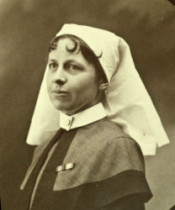Here is the full text of the Foreword which Michael Morpurgo wrote for A Nurse at the Front, published by Simon and Schuster as a hardback in 2012 and in paperback a year later. The book was published in association with the Imperial War Museum.
I am often asked how Michael Morpurgo came to write the Foreword for the book version of Edie’s diaries. The answer is here.
Foreword
The First World War, the horror and the pity of it, still has a tremendous hold on our collective imagination. It has compelled artists, poets, writers, ordinary and extraordinary people, alike. What makes these diaries so remarkable is that, in her vivid and detailed accounts of her working experience in France, Belgium and Germany, Edie Appleton might be considered in any one of those categories.
I was of a generation – perhaps the last – where it was still possible to gain first hand spoken accounts of the First War. I have tackled the subject a number of times, perhaps most notably in War Horse, which I wrote in the early 1980s and which – twenty five years later – has been given a whole new lease of life by the National Theatre and now has another life as a film. My inspiration for War Horse was fuelled directly by conversations I had with a handful of octogenarians who were living at the time in my tiny village of Iddesleigh. A few of them had gone to war with the Yeomanry and recalled vividly the close relationship that existed between horse and trooper. Part of the impulse for me in turning their memories into fiction was in tribute to them: my own way of passing their experiences on. Reading these extraordinary diaries of Edie Appleton, I have something of the same feeling I had, sitting among those brave men, then – a feeling of extraordinary privilege to be listening to such stories at first hand.
In the following pages, whether she is dealing with the daily horrors and atrocities that faced her as a nursing Sister, or the joys she was able to snatch for herself, away from the devastation and carnage, Edie is frank and straight-forward. The authenticity of her voice and of what she writes about is something that cannot be replicated. Her vivid recall of detail is meticulous and yet nothing is superfluous: a bomb that lands so close to the hospital and makes the air ‘so thick with red dust…that we could not see out of our windows.’ Her own emotions are kept movingly in check, but not out of view: ‘we tried to become used to the five-minutely explosions of big shells close to us, but it made my knees shake.’
There are heart-breaking moments, like her insistence on giving the dying and wounded soldiers a ‘clean handkerchief’. She says, ‘I don’t know why, but they love to have it.’ One soldier tells her that she is ‘like a mother to him’ and we can clearly see why: it is in just such small, thoughtful gestures – like a mother sending a child off to school with a straitened jacket, combed hair, clean handkerchief – that we see her great skill and tact in caring and comforting.
What shines through is her good humour, her determination to get on with the job, to make the best of circumstances. And this includes finding moments of sanity in which to appreciate the countryside – a rest in ‘a beautiful wood just outside Hazebrouch, with a picnic tea’, or swimming in the sea on a sultry morning (‘the sea absolutely clear with waves smooth-topped and lumpy’); or, even, luxuriating in the bathrooms and bedrooms of what had once been a posh seaside hotel, turned into a makeshift hospital.
She shows us the reality of dealing with horrors, the ‘overwork’ and the ‘undersleep’, which inevitably sometimes leads to hysteria. One poor sister, who is confronted by a Mortuary Corporal’s dismay at not being able to differentiate dead officers from the other ranks, because (unbelievably) he explains, it made a difference how they were each to be buried: ‘Men is ‘ammered – officers is screwed.’ The sister, Edie tells us, ‘went hysterical and laughed and laughed. The more she told herself it was tragic and not funny, the funnier it all looked.’
There are any number of such insightful observations on any page you care to choose. What is remarkable is that in the midst of the most appalling conditions, Edie had the presence of mind, the strength and the courage, to record these things for herself. It is a further miracle that these diaries have survived and, thanks in large part to the care and generosity of her relations, that we find ourselves in the privileged position to be able to re-live her experiences for ourselves in our own time.
Michael Morpurgo, May, 2011
For an explanation of how this came about click here.

